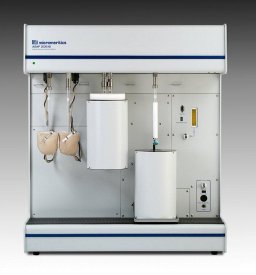Mar 9 2011
Micromeritics ASAP 2020 series gas adsorption systems remain the standard for determining surface area and porosity. With its continued commitment to offering the best in material characterization instrumentation, Micromeritics introduces the new ASAP 2020 HD which includes many features that offer improved isotherm resolution and accuracy. Current ASAP 2020 users can also benefit from these new capabilities by upgrading their instrument to the new HD standard.
Wider pressure measurement capabilities for the ASAP 2020 HD allow isotherm measurements to start an order of magnitude lower in pressure than previous ASAP instruments. This new low pressure capability provides more resolution and new options for materials with micropores like metal organic frameworks, activated carbons, and zeolites. Extending the pressure range reduces the isotherm variations often observed with adsoprtives like nitrogen.

The new Hi-AC technology will benefit all users whose characterization needs require precision and the use of a wide variety of adsorptives (probe molecules). These calculations combine the use of existing Micromeritics technology with real gas properties of the adsorptive. Hi-AC features the precision fluid properties developed by the National Institute of Standards and Technology combined with rigorous free-space control, the real gas equation of state, and compensation for the dynamic void space.
The ASAP 2020 HD also includes the largest library of adsorptive properties of any commercial gas adsorption analyzer. The adsorptive properties library allows users to conveniently select new probe molecules without the worries or difficulties of finding fluid property data. The adsorptive properties library provides the Hi-AC method all fundamental fluid properties in high resolution. The user also has the convenience of high resolution with the click of a button.
Micromeritics pioneered the use of DFT/NLDFT in commercial instruments, recently introducing a series of next-generation finite NLDFT models. With the most comprehensive library of DFT/NLDFT models for textural analysis, the current Micromeritics library includes more than 20 models that cover a range of materials, geometries, and adsorptives. Micromeritics instrument users can select a model that best describes their material.
Material synthesis continues to evolve at what seems to be an exponential pace. This rapid expansion of new materials presents new challenges for characterization. To meet these needs, the ASAP 2020 HD now provides new low pressure desorption capabilities. Low pressure desorption analysis will be beneficial to material scientists who synthesize materials that exhibit adsorbed phase changes during desorption. Metal organic frameworks and small pore zeolites often exhibit low pressure hysteresis during desorption. The new low pressure desorption analysis will provide more resolution for these materials that "breathe".
The ASAP 2020 HD upgrades the chemisorption option with proprietary temperature control. Analytical instruments often require rapid and precise temperature control beyond what is available with common PID controllers. The ASAP 2020 HD includes Micromeritics proprietary temperature control algorithms. This new temperature control provides benefits across the entire temperature range on the ASAP 2020 HD, the largest benefit being improved precision near ambient temperature where it is often the most difficult to control temperature.